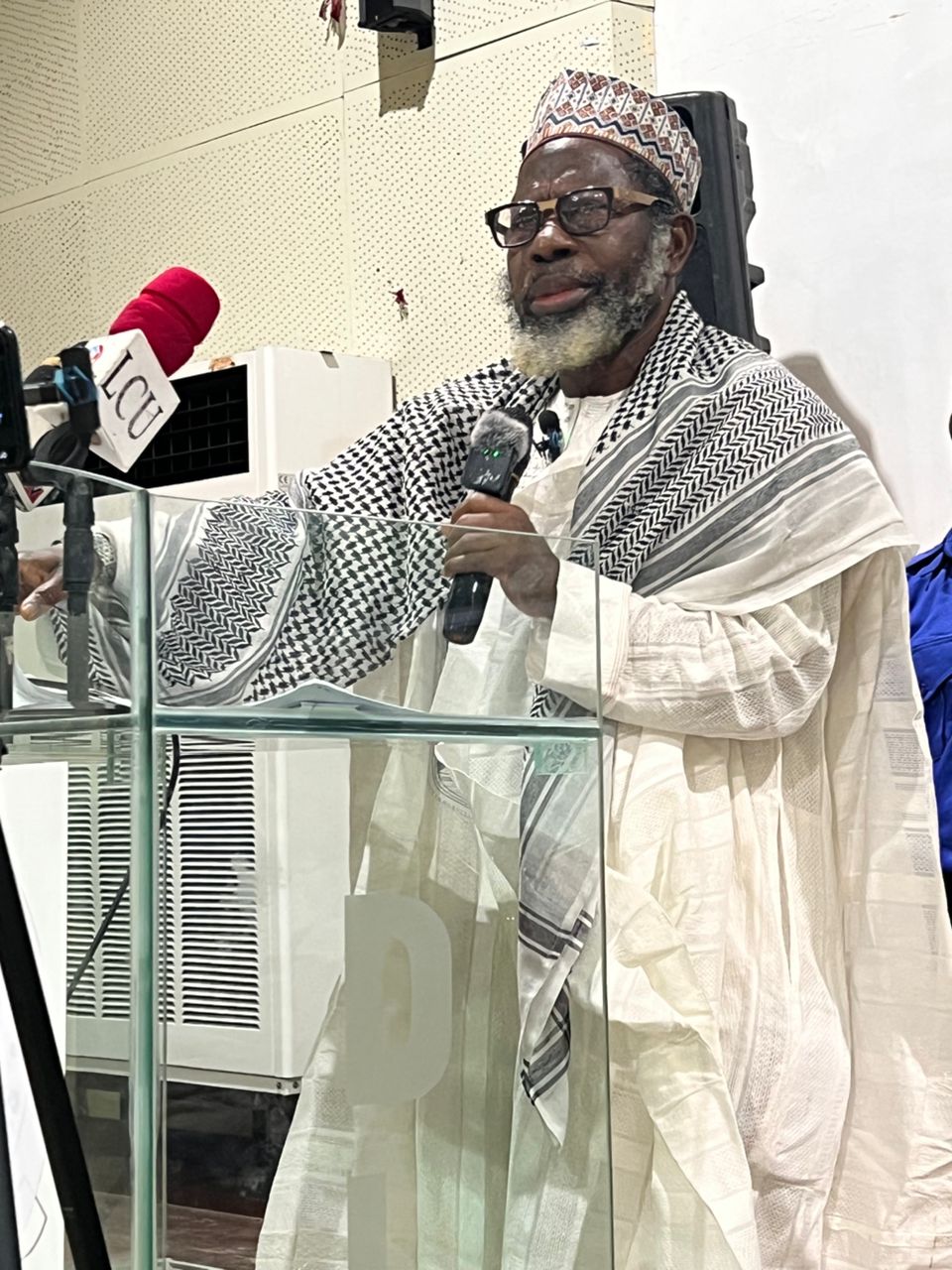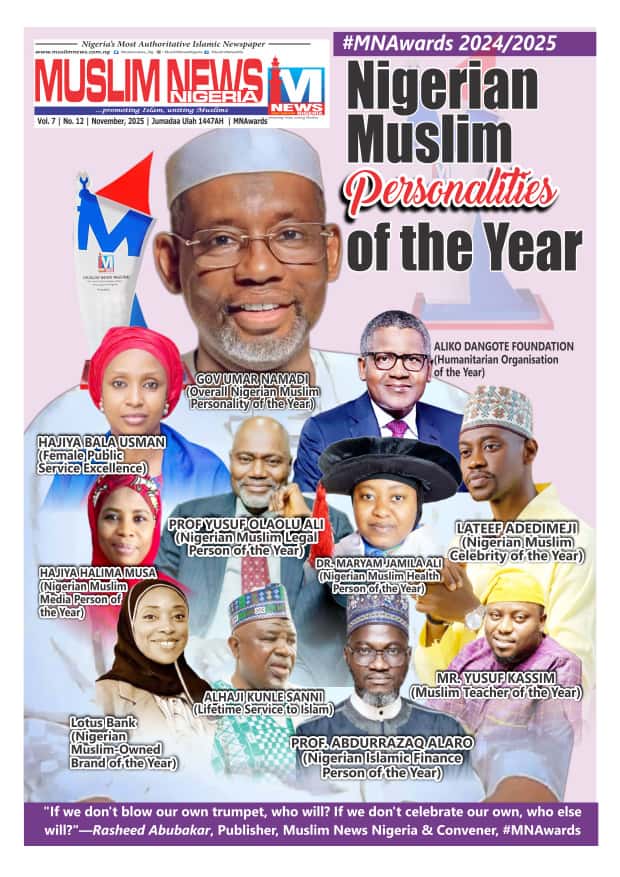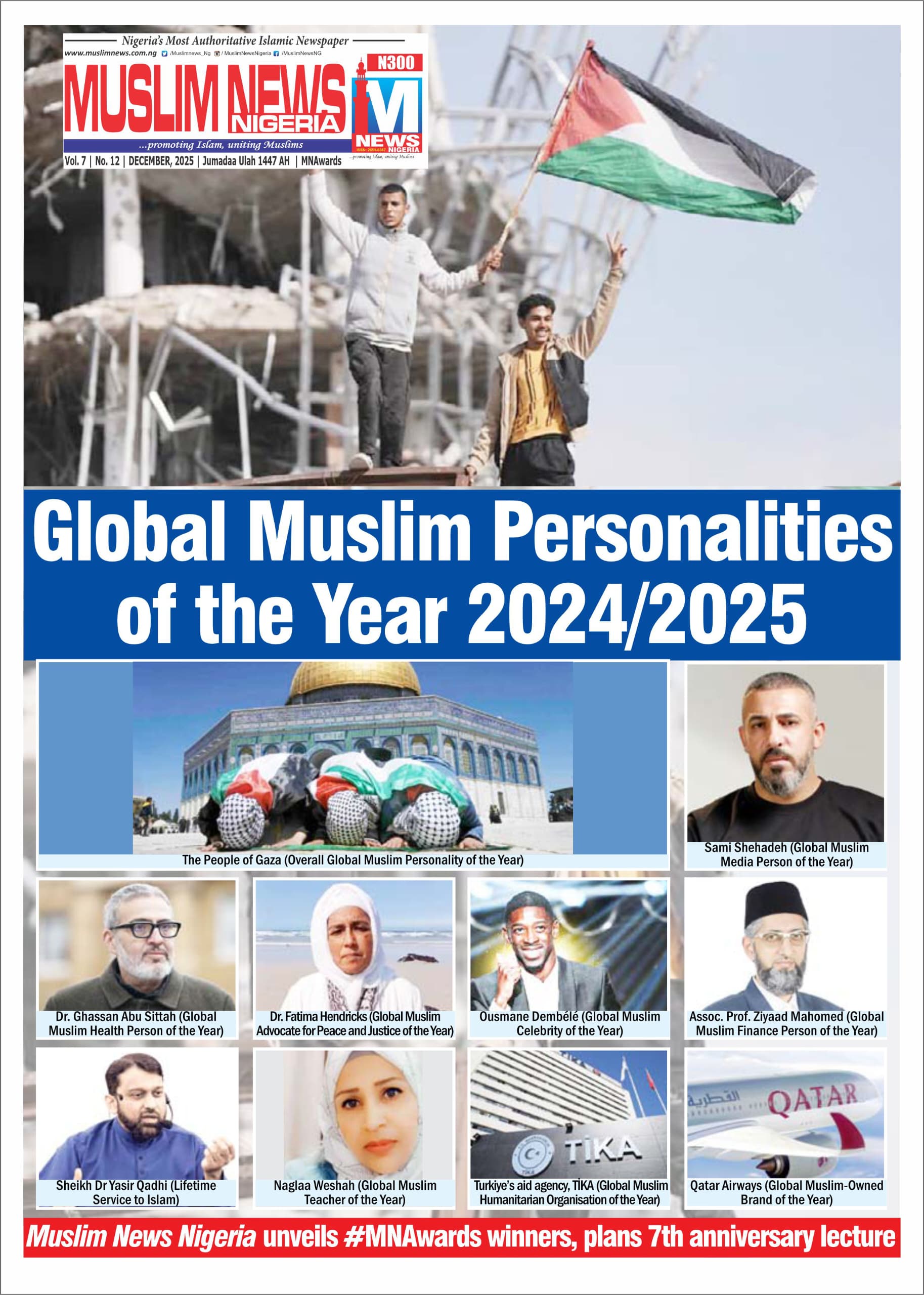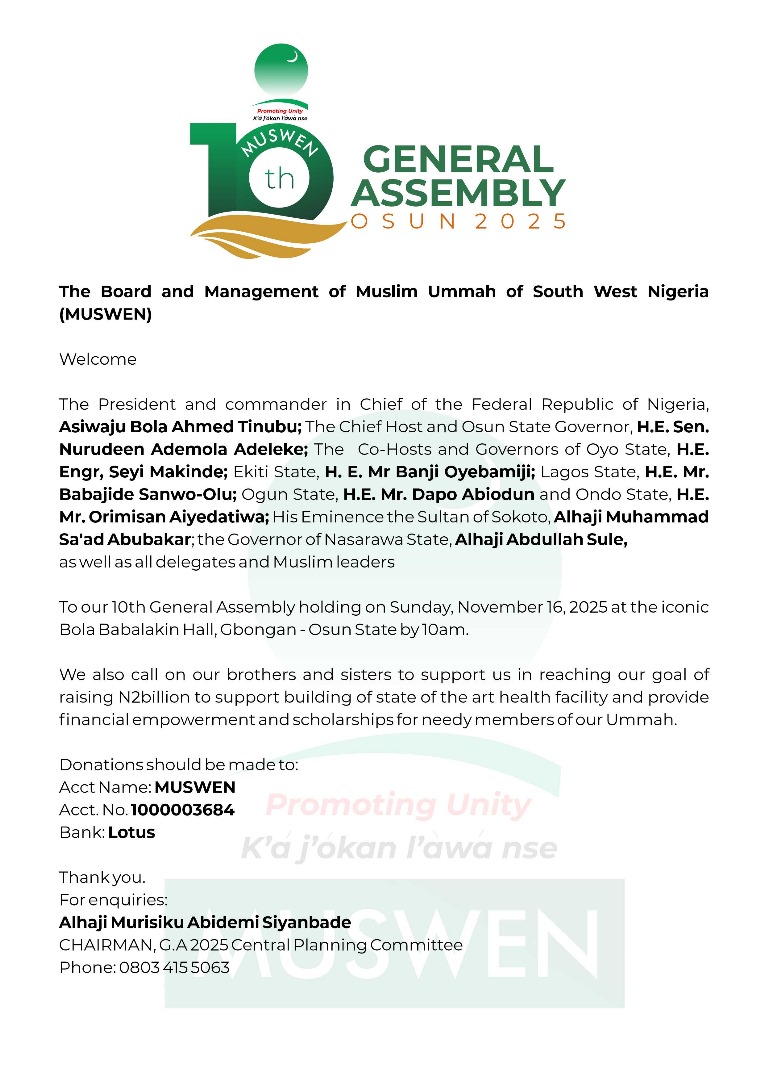* It’s a comprehensive legal and ethical system: Sheikh Shafi’i
The discourse on the implementation of Shari’ah in a pluralistic society like Nigeria took the centre stage on Sunday, October 5, at the Annual State Lecture of The Muslim Congress (TMC), held in the Nurudeen Alao Auditorium, DLI, University of Lagos, Akoka, Lagos.
Muslim News gathered that the lecture with a unified theme: “Nigerian State and Lessons from our contemporary history” was held simultaneously across nine states including Abuja, Osun and Ogun States to mark Nigeria’s 65th Independence anniversary.
The lecture brought together Islamic scholars, traditional rulers, community leaders, and stakeholders to examine two critical topics: “The new world order: local political dynamics, global diplomacy, and pathways to genuine national sovereignty” and “Shari’ah in a pluralistic society: prospects, challenges, and strategies for effective implementation.”
Decries absence of Shari’ah courts of appeal in South-West
Speaking in Lagos, Grand Mufti of the Conference of Islamic Organisations (CIO), Sheikh Dhikrullah Shafi’i, made a new call for the establishment of Shari’ah courts of appeal in southwest states, saying that the demand is not a privilege but a constitutional right that should not cause any social unrest.
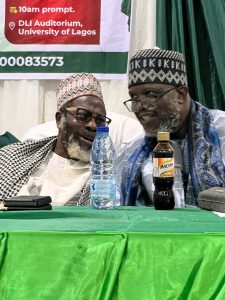
Addressing the audience at the well-attended event, Sheikh Shafi’i noted that while northern states have fully integrated Shari’ah into their legal systems with active Shari’ah courts handling a range of civil and personal matters, the South-West region has yet to follow suit despite constitutional provisions.
He said, “Since the 1999 amendment to the Constitution of the Federal Republic of Nigeria, which recognised the role of Shari’ah courts within the country’s legal framework, no Shari’ah Court of Appeal has been established in the South-West.”
This gap, according to the respected Muslim scholar, highlights a growing need among Muslims in the region for a legal platform where personal and civil matters, such as Nikaah (Muslim marriage), inheritance, and family disputes, can be adjudicated in line with Islamic jurisprudence.
Shari’ah; a comprehensive legal and ethical system
Speaking further, the Grand Mufti described Shari’ah as a comprehensive legal and ethical system guiding all aspects of a Muslim’s life – from worship to family, business and governance — and not limited to criminal law or punitive measures as often misrepresented.
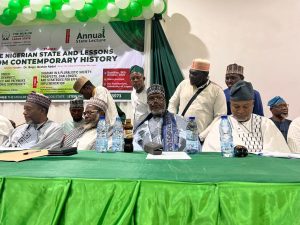
According to him, “In a heterogeneous society, Shari’ah aims to guide the lives of believers by establishing clear rules and principles. Its scope extends beyond mere sanctions, encompassing all aspects of life, including worship, business, work-life, and social interactions. It provides a comprehensive framework, offering detailed explanations of what actions are required and how they should be carried out.”
The respected Muslim scholar highlighted the humanitarian and welfare principles at the heart of Shari’ah, stressing that non-Muslims in Nigeria and across the world have historically benefited from its application.
“The main concerns of Shari’ah revolve around humanity and welfarism. Wherever Shari’ah thrives, non-Muslims are among the major beneficiaries. Christians, Jews and even atheists alike have enjoyed the fruits of Shari’ah in the history of Islam.
“Even in Nigeria, during the late Buhari led administration, Sukuk bond was introduced, and the benefits were enjoyed by Nigerians across different beliefs and backgrounds. When non-interest Islamic banking came to Nigeria, Christians non-Muslims and people of no faith have gotten loans for their businesses without interest,” he noted.
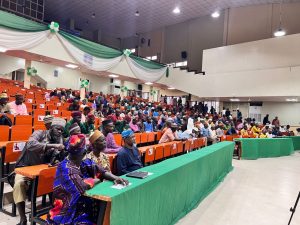
Sheikh Shafi’i argued that Shari’ah does not compel non-Muslims but rather governs the affairs of Muslims in accordance with their faith. He called for mutual respect between faiths, where Muslims and non-Muslims alike can freely practice their beliefs.
“Shari’ah affirms the ideal without creating any cause for alarm. It doesn’t impose or compel. This is evident in the life of the Prophet (SAW). When he got to Madina and met people of different beliefs, his leadership was founded on the verse of the Qur’an (109: 6), which says, “You shall have your religion and I shall have my religion” In essence, no one was compelled to practice Islam,” he said.
He therefore stressed the need for greater understanding and constitutional recognition of Shari’ah courts of Appeal, especially in South-West Nigeria.
Khaleefatu Zuglool urges govt to strengthen security, education
Khaleefatu Zuglool called on Nigerian leaders at all levels to take deliberate and strategic steps toward national development by prioritising internal security, educational reform, and economic diversification.
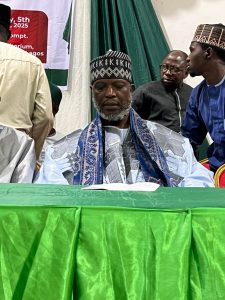
He stressed that no meaningful development can take place in an insecure nation. “A nation without security is a nation in crisis,” he said, urging the government to boost the operational capacity and welfare of the armed forces in order to effectively combat insecurity.
He stressed that no meaningful development can take place in an insecure nation. “A nation without security is a nation in crisis,” he said, urging the government to boost the operational capacity and welfare of the armed forces in order to effectively combat insecurity.
Lagos Chief Imam urges National Self-Examination
One of the Chief Tafsir scholars of the Lagos Central Mosque, Imam Shakiru Ayinde Gafar, popularly known as ‘Mofesaye’, called on Nigerians to reflect deeply on the country’s journey since independence, stating that the nation’s current state is a direct outcome of past actions and choices.
Imam Mofesaye, who represented the Chief Imam of Lagos, Sheikh Engr. Sulaimon Oluwatoyin Abou-Nolla, said he has witnessed nearly six decades of Nigeria’s history, emphasized the importance of learning from the past to shape a better future.
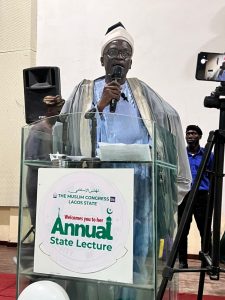
“Our past has given birth to what we are experiencing today,” he said, while delivering the message of the Chief Imam of Lagos, adding that, “Whether we like it or not, what we are doing today will determine what we experience tomorrow.”
Quoting the Qur’an, he highlighted how Allah endowed a nation with blessings, peace, and prosperity, but the people’s ingratitude and misdeeds led to hardship, insecurity, and social decay.
He urged Nigerians, especially Muslims, to return to the divine guidance provided in the Qur’an, and identify where the country is “getting it wrong,” in order to chart a path forward based on faith, responsibility, and collective moral discipline.
He lauded TMC for organising the impactful gathering that will drive positive change in the nation and the Muslim community.
Imam Mofesaye also addressed fears surrounding implementation of Shari’ah especially in the southwest, attributing the negative perception to ignorance and misinterpretation.
“Many are scared when Shari’ah is mentioned because they don’t understand it. But we have a duty to educate and correct this narrative,” he concluded.
YABATECH Rector advocates positive mindset
Dr. Engr. Ibrahim Adedotun Abdul, Rector of Yaba College of Technology, YABATECH, in his keynote address urged Nigerians to adopt a positive mindset towards the country, stressing that growth and national development are only possible when citizens actively play their part.
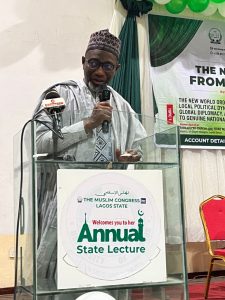
Dr Abdul noted that many Nigerians have lost hope in the system, believing the country cannot work. He however described such a mindset as counterproductive, noting that “little drops of water make a mighty ocean.”
Amir TMC urges deep, sober reflection
Amir of The Muslim Congress (TMC), Alhaji Abdulwasi’i Bangbala, called for deep and sober reflection on Nigeria’s 65-year journey, urging citizens to re-examine the nation’s past and present with a view to shaping a better future.
Delivering his address through the Waali, TMC, Lagos State, Malam Tajudeen Yusuf Olusesi, the Amir described the annual lecture as a vital platform for intellectual engagement and national development.
“As our nation marks 65 years of nationhood, it gives me great pleasure to welcome you all to this year’s edition of the Annual State Lecture — a significant occasion that has become a crucial space for intellectual discourse, moral reflection, and constructive contributions to the issues that shape our beloved nation, Nigeria,” he said.
TMC Lagos Waali extols speakers at Annual State Lecture
Speaking with Muslim News, Mal Olusesi expressed appreciation to Almighty Allah for the successful hosting of the 2025 Annual State Lecture, while commending the keynote speaker and guest lecturers for their impactful and thought-provoking contributions.
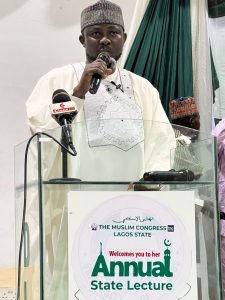
He praised the quality of discourse, noting that this year’s theme aligns with the organisation’s mission to engage national leaders and policymakers on issues of public concern.
“At 65, we cannot remain silent. We must speak truth to power and offer direction where needed,” he stated, reaffirming TMC’s commitment to nation-building through knowledge-driven engagement.
Dignitaries present at the event included Alhaji Taiwo Hassan Adesina, Secretary General, TMC; Sheikh AbdulQadri Ayorinde, who represented the Speaker of the Lagos State House of Assembly, Rt. Hon. Mudashiru Obasa; Dr. Mustapha AbdulQadri, Chief Medical Director, Shomolu General Hospital; Hajia Aisha Tiamiyu, representative of the Director-General of the National Orientation Agency (NOA), Lagos State; Sheikh Sherifdeen Ibrahim, Naibul Amir, Dawah Affairs, TMC and Dr. Abdullah Shuaib, Lead Consultant, AS & A Associates, among others.

